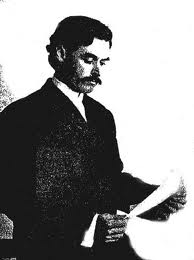
Maynard Shipley was born on 1 December 1872 in Baltimore, Maryland. He was the fourth of six sons. Elmon Shipley, the family’s patriarch, could trace his American ancestors back to seventeenth-century Maryland. His mother, Sarah Armitage Jerome, came from a prominent Baltimore family. In Miriam Allen de Ford’s biography of Shipley, she wrote Elmon was “about as bad a husband and father as can be imagined—a domestic tyrant, a philanderer, and a paragon of refined selfishness.” Elmon made a good living and was religious for a time, but eventually moved into the wholesale liquor business, which had him out of church and becoming a free-thinker. This last influenced Maynard greatly. In 1887, Elmon deserted the family.
The next years of Shipley’s life were difficult, very difficult. He moved from job to job, including spending a horrid six-months working on a farm. He had a serious falling out with his mother. He ended his schooling—but not his education. He read widely and wrote philosophical essays. (A few of these he had a chance to publish while working on a small Baltimore publication.) Around 1890, his father—who had been in contact with the family since moving to the state of Washington—accepted his (ex-) wife’s offer to take on Maynard, and so the boy went West.
Maynard Shipley continued to live a hardscrabble life in the West, although he did find his most permanent profession: shoe salesman. He also continued his independent studies. And, made room for romance. A good looking boy, he had many girlfriends. Eventually, he settled on one girl, Mary Josephine Beede, the daughter of a theater owner. They married in 1893 under duress—Beede’s father was threatening to move the family to South Africa—and against the wishes of both families. (Shipley’s mother and four of his brothers had also come West, and were living with his father again.) The Beede’s left for the San Francisco Bay Area rather than South Africa, and soon their daughter and son-in-law followed, though they found only more hardship in the Golden State. Maynard and Josephine divorced in 1896.
After his marriage ended, Shipley moved back and forth between Seattle and San Francisco until 1902, when he started to attend Stanford, paying his way by teaching piano (which he had also taught himself). Shipley’s interest had been turning increasingly toward criminology and the death penalty, and he studied this as well as biology, but found himself not cut out for academia. He left Stanford but stayed in Palo Alto, unofficially connected to the school so he could continue to study in his spare time He became an opponent of capital punishment, arguing that it had no deterrent value. In 1902, he married again, Eugenie Marie Hagg, a private language teacher. They ran a prepatory school for a time, then moved to Reno.
It was in Nevada that he discovered socialism. Both he and Eugenie joined the party. But it cost them: they lost students. Pressed for work, Shipley moved to Oakland, where he worked for the Socialist Party, including two years editing its California organ, The World. He was also criss-crossing the state, soapboxing. And continuing his studies in criminology and natural science. His marriage, though, was failing, and around 1913 he deserted Eugenie, returning once more to Washington (though his parents had by now moved back East, and his mother had died) and then East again. Through this his interest remained unchanged, although like the Socialist Party generally, he opposed the Great War.
Update (2/7/2011): Maynard Shipley was, with Kenneth Macnichol, among those who opposed
Maynard Shipley continued to live a hardscrabble life in the West, although he did find his most permanent profession: shoe salesman. He also continued his independent studies. And, made room for romance. A good looking boy, he had many girlfriends. Eventually, he settled on one girl, Mary Josephine Beede, the daughter of a theater owner. They married in 1893 under duress—Beede’s father was threatening to move the family to South Africa—and against the wishes of both families. (Shipley’s mother and four of his brothers had also come West, and were living with his father again.) The Beede’s left for the San Francisco Bay Area rather than South Africa, and soon their daughter and son-in-law followed, though they found only more hardship in the Golden State. Maynard and Josephine divorced in 1896.
After his marriage ended, Shipley moved back and forth between Seattle and San Francisco until 1902, when he started to attend Stanford, paying his way by teaching piano (which he had also taught himself). Shipley’s interest had been turning increasingly toward criminology and the death penalty, and he studied this as well as biology, but found himself not cut out for academia. He left Stanford but stayed in Palo Alto, unofficially connected to the school so he could continue to study in his spare time He became an opponent of capital punishment, arguing that it had no deterrent value. In 1902, he married again, Eugenie Marie Hagg, a private language teacher. They ran a prepatory school for a time, then moved to Reno.
It was in Nevada that he discovered socialism. Both he and Eugenie joined the party. But it cost them: they lost students. Pressed for work, Shipley moved to Oakland, where he worked for the Socialist Party, including two years editing its California organ, The World. He was also criss-crossing the state, soapboxing. And continuing his studies in criminology and natural science. His marriage, though, was failing, and around 1913 he deserted Eugenie, returning once more to Washington (though his parents had by now moved back East, and his mother had died) and then East again. Through this his interest remained unchanged, although like the Socialist Party generally, he opposed the Great War.
Update (2/7/2011): Maynard Shipley was, with Kenneth Macnichol, among those who opposed
